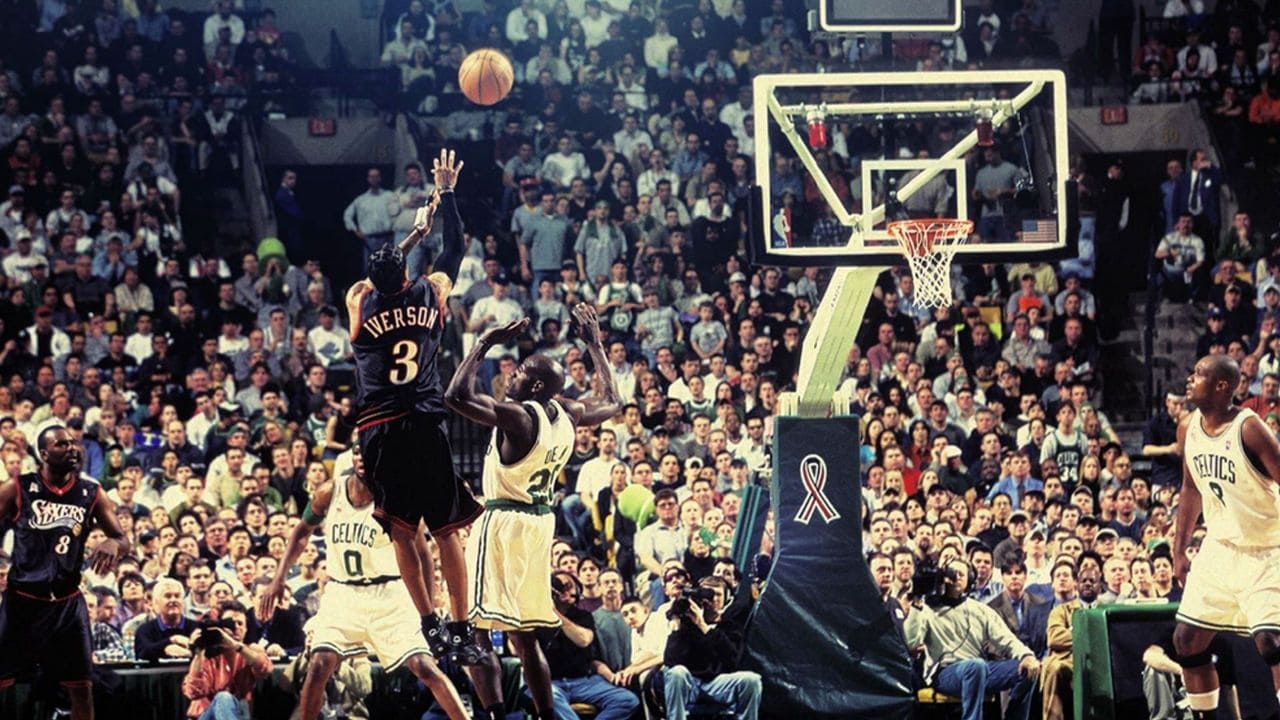Inadvands
Boring, over-political, tech fuzed mess
Beystiman
It's fun, it's light, [but] it has a hard time when its tries to get heavy.
Robert Joyner
The plot isn't so bad, but the pace of storytelling is too slow which makes people bored. Certain moments are so obvious and unnecessary for the main plot. I would've fast-forwarded those moments if it was an online streaming. The ending looks like implying a sequel, not sure if this movie will get one
Jakoba
True to its essence, the characters remain on the same line and manage to entertain the viewer, each highlighting their own distinctive qualities or touches.
filups
You were probably deceived by the media's portrayal of a brash, conceited, ball-hog. In reality, Allen Iverson was a saint. A sadly misunderstood saint. With his nightly miracles on the hardwood captured on tape for all eternity, there can be no doubt. Pope Francis, are you listening?
Bryson
Iverson is an outstanding documentary about a man's life and how he became a NBA all star. This documentary gives an insight to the life of the basketball legend Allen Iverson. It explains where he came from and everything he did to get to the NBA. Every aspect of his life including things such as when he went to college, where he grew up, and even when and why he went to jail. There was many struggles I drain had, but his main struggle was with himself. This documentary was made to understand the life of one of the greatest basketball players to ever live. Much is to be learned from this film and is one of the most inspiring documentaries I have seen. Iverson is a documentary that can connect with every individual out there. Pathos is rhetorical concept that is used in films to connect with the viewer on an emotional level. It is the strongest rhetorical concept because it is very easy to connect with someone's emotions. It is very effective because when an inspiring or amazing thing happens, viewers instantly feel a sense of happiness and amazement. Pathos is used throughout the whole film by connecting people with Allen Iverson's struggles and his good times. Another expressive rhetorical concept is called logos. Logos uses facts, stats, and reasoning to appeal to viewers through logic. Logos is expressed through percentages and stats when it comes to sports in this documentary. Facts grab people's attention because people strive for information, and it's hard to stop watching when so much information is given to you. Throughout the documentary many stats regarding his basketball career are shown, and many facts about his childhood life are given. Many people from Iverson's past express what Iverson did in their lives. Ethos is a rhetorical concept that uses credibility to appeal to an audience. Evidence, ethics, and credibility are examples of ethos that are used in this film. Documentaries must have ethos in them so that people can believe them in prefer for them to watch them. Without credibility and evidence this documentary wouldn't be worth watching to most people. This documentary brings in Iverson's past coaches, friends, and family to obtain evidence and trustworthiness. In this documentary pathos was expressed a multitude of times. It is the most pronounced rhetorical concept in this documentary and the most appealing. The film explains Iverson's life from childhood to where he is now. During his childhood in the documentary, sadness was the most experienced emotion for the viewer. His childhood wasn't great and wasn't typical. He was around people his age that used drugs and people who weren't very good people. When Iverson explains how is father was involved in his life is the time where a lot of sadness is felt. He explains how his father wasn't there and was always in jail. People connect with that because they either had a similar experience in there life or can realize that it is hard to live without a father. As he gets into his basketball years is when a great amount of happiness and aspiration comes into the film. This is the point when viewers appeal the most to happiness, and it gives them a sense of fulfillment from this happiness. Watching him thrive in his basketball career connects them to the film. Credible facts in this documentary appeal to just about everybody. Facts and credible information is presented throughout this film. During the time when Iverson was in jail, the film explained how Iverson would receive bags and bags full of mail from various people. Also when he was in the NBA he won rookie of the year. NBA announcers explained his stats and how he scored higher per game than Shaq. Announcers and news reports from all over the United States shared information that Iverson was the player who started the clothing trend of baggy clothes and tattoo sleeves. After his career, he created a hardcore rap album. This album was reported by Iverson himself in the documentary that it was never commercially released. There have been a lot of people in Iverson's life. Ethos is the type of rhetorical appeal where credibility is used to appeal to the viewers. Credibility is built in the documentary through interviews and what Iverson said. His former college coach expressed how he took Iverson under his wing and made sure he did well in school. Every time Iverson messes up in school, his coach said he would set him straight. Iverson's childhood friend talked about how every morning at six o'clock Iverson would knock on his door wanting to play basketball. He also explained how Iverson loved any sport and put his heart into every one he played. Iverson had a though life growing up. He grew up in the hood and his mom struggled to provide while his father was in and out of jail. Despite these challenges he became a talented, hardworking individual who achieved his goals. He played football and basketball in high school an excelled at both. He had everything going for him until he ended up in the wrong place at the wrong time. He was at a bowling alley when a brawl broke out and he fled. Even though Iverson didn't take part in the brawl, he was accused of harming three people. He was sentenced to jail. Luckily the governor pardoned him after several months allowing him to finish high school. Following high school he was accepted into Georgetown University where he pursued his basketball dream. His coach made him do well in school and finish college. He was drafted to the 76ers as the first round pick. This point in his life was when he excelled the most. He was able to provide for his family for the rest of their lives while doing what he loved. He continued his career with the 76ers until he retired in October of 2013.
isaac
This was a great inspirational, motivational movie. Before this movie, I had no idea who Iverson was . After this movie, he was my favorite player. Even though Iversons presence in the world wasn't as impacting as people like Muhammad ali or Martin Luther Kings presence was, this film made it seem like it was.This film shows you many things you probably didn't know about the man who could have and was one of the greatest athletes , not just for what he did on the court , but also off the court. Despite this film being a documentary, it was made in a story-like fashion. It was also made in chronological order , which adds to it being an even better story/documentary.Since this movie is expressing Iversons passion for the sport , it can be touching for basketball lovers. I felt slightly emotional towards the end of the movie. I strongly recommend this film for basketball fans , sport fanatics or anyone interested in important figures in the history of sport. Its suitable and interesting for any audience , that's what makes such a great film.
Thomas Drufke
Allen Iverson was one of the most controversial players to ever step foot on an NBA floor. He changed the way players played the game on and off the court. He introduced the NBA to the baggy clothes and the sleeves of tattoos. But he also had one of the meanest crossovers and killer jump shots. He was not only an unbelievable basketball player but he turned into a cultural icon in the late 90's and early 2000's. I remember seeing the excessive coverage he received, good and bad.Being in my early 20's now, Iverson was one of the many superstars I have grown up watching, along with Garnett, Kobe, and LeBron. So was very intrigued to see how this documentary would approach such a polarizing figure. And I came out pleased. It's not as focused as the recent Kobe Bryant documentary or as visceral as a 30 for 30 doc, but it was a solid biography to say the least. The film takes a big step by using interviews with comparisons to MLK or Malcom X, and I wouldn't say it proves he was anywhere near as impactful as they were, but Iverson was very famous nonetheless. His jerseys were consistently among the most highly purchased every year, no matter if he changed his team or not. But he had his off the court issues. Which included spending numerous months in jail in between high school and college as he was supposedly wrongfully convicted of a crime. It was here where I noticed the film took the approach of using interviews from a wide variety of sources instead of getting updated footage like most docs. It's not necessarily a bad thing, but it tends to not feel as fresh this way.Once he made it to the NBA, he took the league by storm. With accolades as good as anybody. The film focused on how much he didn't fit in though, it was almost like the business and atmosphere of the NBA was never made for someone like Iverson. He was as gifted as any point guard to ever enter the league, but there were times he just didn't care all that much. I loved the way one interviewee described it "He had good intentions, but he just didn't take it seriously". And that's unfortunate, because like Larry Brown said, he could have been the most popular player in league history. Lastly, I really liked that the film addressed the infamous 'Practice' interview and just how misunderstood that whole thing was. Throughout the documentary you see a different side to Allen and various details about the things you already knew. Now sure, the film gets uneven at times. With a film that goes through his life in order, it seems hard to do, but the focus shifts several times. And I would have liked to have seen new and updated interviews. There's virtually no new footage for the actual film.+Sets things straight +Legit biography +Shows his cultural icon status-Uneven at times -No new footage 7.6/10


